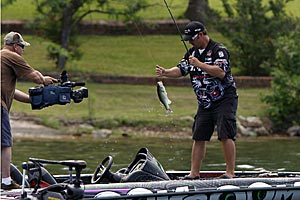
For some, surprisingly ordinary things.
“I usually try to keep it low-key,” said Gerald Swindle. “I’ve learned over the last six or eight Classics that on Thursday night, the best thing to do, for me, is to just chill, take some one-on-one time with my wife, and get my head together.”
They’ll probably have dinner, then watch TV in their hotel room, he said.
“When I lay down tonight, that will be the time when I think about what I have to do and rehearse in my head my first steps. But I won’t think all night about it,” said the Warrior, Ala., pro who is appearing in the Classic for the 12th time.
Dustin Wilks of Rocky Mount, N.C., said he will spend time reviewing possible competition scenarios. He’ll probably calculate how much time he’d have left to fish if he locks down to lower pools. He might make another trip to the boatyard if inspiration strikes.
“I sometimes have a crazy idea pop into my head at the last minute, and I’ll want to work on tackle for it,” he said.
Otherwise, he’ll do his best to relax with his wife, eat dinner and turn in early for his fifth Classic and first since 2009, when the Classic first was on the Red River.
Classic rookie Andrew Upshaw, the 25-year-old Carhartt College B.A.S.S. champ from Hemphill, Texas, said his evening will be spent polishing his game plan and eating a good dinner.
Upshaw said he is thriving on the pressure of his first Classic, and that he wants and needs it to do his best.
“I don’t feel nervous, I don’t feel I need pep talks,” he said.
Fred Roumbanis, back in the Classic after a two-year absence, said he will get some motivational coaching from a childhood friend in California, Ted Perry, who helps him before each big tournament.
“He has me visualize what I need to do to win, like catching a fish, or casting,” Roumbanis said. “He doesn’t talk about the fishing, he talks about how I can get my mind right. It works so well I would not want to share him.”
Other than that, “I’m going to cherish the time with my wife and two boys, and see some friends,” said Roumbanis, father of a newborn as well as a 4-year-old.
Todd Faircloth said he spends Classic eve with his wife and kids and has an early, simple dinner.
“The ideal situation is to have all your tackle done so you can relax that last evening,” he said.
This is Faircloth’s 10th Classic, and he still feels a touch nervous, especially in the final hours.
“If you don’t get the butterflies a little bit, tournament fishing is probably not what you’re supposed to be doing,” he said.
Kevin Wirth of Crestwood, Ky., said early prep is the key to keeping his cool the night before a Classic. He had all his tackle work done and his boat fueled, on Wednesday. He feels he could easily take a 25-mile drive for crawfish at “one of the best places I’ve been.”
“I’m thinking this: by eating crawfish, you get that smell on your hands, so maybe that scent will help tomorrow.” He smiled as he said it.
So who can sleep on the eve before a Classic?
Swindle: “I’ve done it enough now, I get so tired, I just go to sleep. The problem is staying asleep, or waking up too early.”
Wilks: “Most times I can. And I don’t wake up in the morning by myself. I need the alarm, but I make myself get up when it goes off. If I hit the snooze, I’ll snooze. I am not a morning person.”
Upshaw: “I am thinking so much about my plan, I am force-feeding myself, so even when I’m sleeping, I’ll wake up thinking about it.”
Roumbanis: “Sometimes I have trouble sleeping. This morning (Thursday), I got up and went to the boatyard and got all my tackle done before the sun came up. I knew if my tackle wasn’t done I’d wake up tonight thinking about it.”
Faircloth: “It is hard to sleep. Going through my mind is how the first Classic day will unfold, what I’ll do if Plan A or B don’t work out.”
Wirth: “I wake up every night about every hour anyway. Tomorrow, I’ll get up when I wake at 5.”
